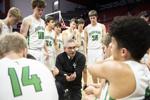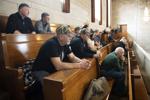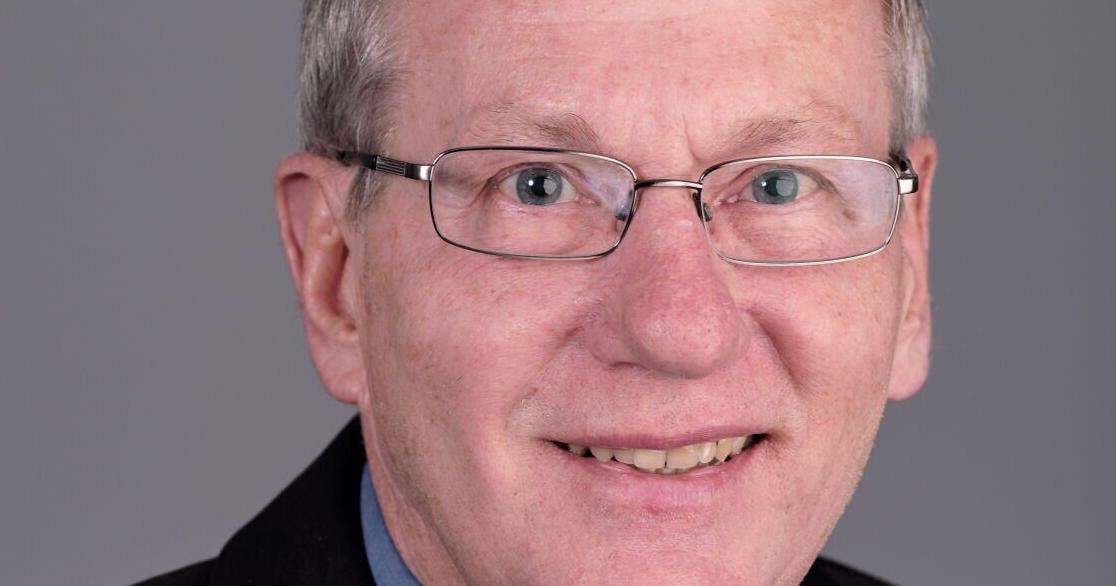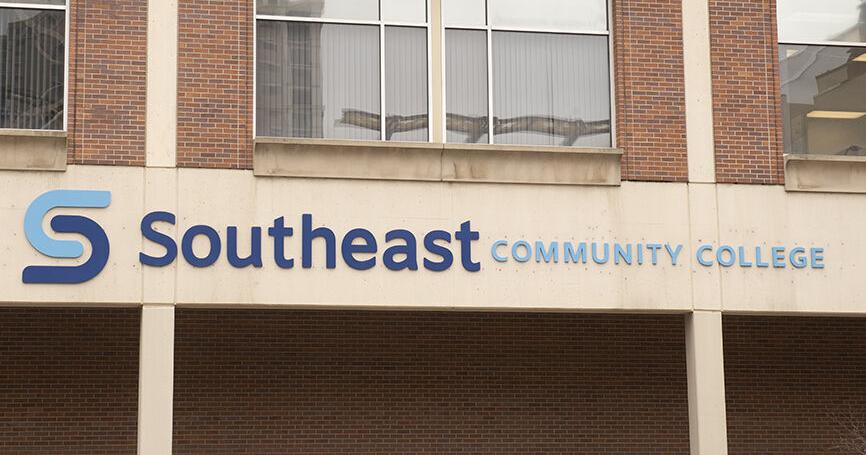Watch now: Union says unfair labor practices happening at UNL construction sites | Education
The United Brotherhood of Carpenters picketed a worksite at the University of Nebraska-Lincoln on Friday to draw attention to what it says are unfair labor practices involving contractors working on those projects.
Blowing whistles and marching on the sidewalk at 14th and Vine streets, near an ongoing renovation of Mabel Lee Hall, members of the carpenters’ union said Friday’s action was part of an area campaign.
“Right now, as we speak, there are labor brokers on the project with a number of workers who are being paid in cash,” said Felicia Hilton, the political director of the North Central States Regional Council of Carpenters.
Hilton, who spoke at the NU Board of Regents’ meeting earlier Friday, was joined by about two dozen union members, each wearing a neon vest that read “Standing up to Tax Fraud.”
Santos Hernandez carries signs to a North Central States Regional Council of Carpenters picket line at 14th and Vine streets Friday.
According to Hilton, the union is seeking to draw attention to construction companies — including those working on the Mabel Lee Hall project, the Barkley Memorial Center on East Campus, and the athletic training complex near Memorial Stadium — that pay laborers under the table.
People are also reading…
Workers hired by labor brokers do not receive benefits such as health insurance or workers’ compensation if they are injured on the job, which Hilton told the board can create an added cost to taxpayers.
The companies that hire workers off-the-books, or classify them as independent contractors, also do not deduct payroll taxes, Hilton said, while the workers themselves do not pay state or federal income taxes on their earnings.
Ultimately, not paying health insurance, workers’ compensation, or deducting taxes allows companies to submit lower bids than competitors, Hilton said.
The union said labor brokers are more often involved with sub-contractors on larger projects, but it did not specifically name any companies in protesting unfair practices Friday.
Regents approve adding cyberattack losses to self-insurance policy
Nebraska regents OK creation of women’s health research center at UNMC
College of Engineering beginning to see payoff on investments into people, facilities
“Our issue is that there are legitimate businesses, union and non-union, who cannot compete for this work, who cannot submit a bid for this work because they don’t practice this model,” Hilton said.
That’s particularly troubling as NU seeks to address an $800 million backlog of deferred maintenance projects through 2062, she said. NU received $400 million in bond financing from a 2021 sale to begin renovating and replacing its aging infrastructure across its four campuses.
“We think it’s a horrible business model, and we think the university should not support a model like this,” she added.
Chris Kabourek, NU’s vice president for business and finance, said the university requires companies to follow all applicable state and federal labor laws when they are awarded projects.
A committee comprised of university and non-university staff responsible for reviewing proposals submitted for projects also asks about a company’s ability to do the work, Kabourek said, which includes following the law.
A call to a spokesperson for Hausmann Construction, which is the general contractor working on several of the UNL projects, was not answered Friday.
Hilton said the North Central States Regional Council of Carpenters has a questionnaire it says will help vet contractors and sub-contractors who meet best practices.
Kabourek said NU will arrange a meeting between its facilities staff and the carpenters’ union to hear its concerns and see if they can address the issues raised at Friday’s meeting.
Top Journal Star photos for March
Top Journal Star photos for March

A driver in a pickup truck makes their way along a northern portion of 27th street as a break in the clouds after Tuesday’s storm allows for a final burst of color on March 22, 2022. KENNETH FERRIERA, Journal Star
Top Journal Star photos for March

Elton John points to the crowd after he finishes his opener, “Bennie And The Jets,” on Sunday, March 27, 2022, during the Elton John: Farewell Yellow Brick Road tour at the Pinnacle Bank Arena. JAIDEN TRIPI, Journal Star
Top Journal Star photos for March

Nebraska head baseball coach Will Bolt talks with his team between innings during the baseball game on Sunday, March 27, 2022, between Michigan and Nebraska at Haymarket Park. JAIDEN TRIPI, Journal Star
Top Journal Star photos for March

Cass Warren, 12, throws a disc golf next to his father Dan Warren on a windy afternoon at Pioneers Park, Friday, March 25, 2022. JUSTIN WAN, Journal Star
Top Journal Star photos for March

Theresa Thibodeau, Breland Ridenour, Charles Herbster, and Brett Lindstrom (from left) participate in a discourse during a gubernatorial debate hosted at the Nebraska Public Media studios on March 24, 2022. KENNETH FERRIERA, Journal Star
Top Journal Star photos for March

Lincoln Pius X’s Ellie Wolseger rests on the mat after an attempt in the girls pole vault on Thursday, March 24, 2022, during the Northeast Relays track meet at Lincoln High. JAIDEN TRIPI, Journal Star
Top Journal Star photos for March

Kindergartener Lyum Brady eats lunch on Wednesday, March 23, 2022, at Hartley Elementary School. GWYNETH ROBERTS, Journal Star
Top Journal Star photos for March

A Lincoln city crew cleans up a fallen tree near 15th and Sumner streets, Tuesday, March 22, 2022. JUSTIN WAN, Journal Star
Top Journal Star photos for March

Cars travel at the intersection of O and 16th streets on a rainy night, Monday, March 21, 2022. JUSTIN WAN, Journal Star
Top Journal Star photos for March

As the sun goes down, fans watch during the baseball game Friday, March 18, 2022, between Nebraska and Texas A&M-Corpus Christian at Haymarket Park. JAIDEN TRIPI, Journal Star
Top Journal Star photos for March

Nebraska’s Isabelle Bourne and Gonzaga’s Yvonne Ejim dive after a loose ball in the first quarter during the first round of the NCAA Tournament at the KFC Yum! Center on March 18, 2022, in Louisville, Kentucky. KENNETH FERRIERA, Journal Star
Top Journal Star photos for March

Nebraska’s Griffin Everitt is congragulated by teammates Lei Brice Matthews and Luke Jessen after hitting a 3-run RBI against New Mexico State in the third inning at Haymarket Park on Tuesday, March 15, 2022. KENNETH FERRIERA, Journal Star
Top Journal Star photos for March

Bryan Health staff pray during a ceremony to mark the two-year anniversary of COVID-19 on Tuesday, March 15, 2022, at Bryan East Campus. GWYNETH ROBERTS, Journal Star
Top Journal Star photos for March

Nebraska fans cheer for free T-shirts in the second inning of a game against Omaha on Monday, March 14, 2022, at Haymarket Park. GWYNETH ROBERTS, Journal Star
Top Journal Star photos for March

Malaya Burks (left), 15, plays basketball with his brother DeShawn Burks, Monday, March 14, 2022, at Normal Boulevard & South Basketball Courts. JUSTIN WAN, Journal Star
Top Journal Star photos for March

The Nebraska women’s basketball team reacts during their bracket announcement Sunday at the Pinnacle Bank Arena. JAIDEN TRIPI, Journal Star
Top Journal Star photos for March

Elkhorn North celebrates their championship victory over Omaha Skutt after the Class B girls championship Saturday, March 12, 2022, at Pinnacle Bank Arena. JAIDEN TRIPI, Journal Star
Top Journal Star photos for March

Humphrey/LHF’s Ethan Keller celebrates after his team scores three against Grand Island CC in the fourth quarter during the Class C-2 boys championship at Pinnacle Bank Arena on March 11, 2022. KENNETH FERRIERA, Journal Star
Top Journal Star photos for March

Lt. Col. Christopher Perrone (R), of Papillion, hugs his daughter, Faith, 21, during a welcome home event for soldiers of the Nebraska National Guard’s 67th Maneuver Enhancement Brigade on Friday, March 11, 2022, at the Nebraska Army National Guard base. GWYNETH ROBERTS, Journal Star
Top Journal Star photos for March

Lincoln Lutheran fans react in the closing minutes of the regulation of the Class C-1 girls championship game against North Bend Central, Friday, March 11, 2022, at Pinnacle Bank Arena. JUSTIN WAN, Journal Star
Top Journal Star photos for March

Falls City SH’s head coach Doug Goltz talks to his team between periods during a Class D-2 boys semifinals game Thursday at Devaney Sports Center. JAIDEN TRIPI, Journal Star
Top Journal Star photos for March

A pedestrian and a cyclist cross a snowy Goodhue Boulevard on Thursday, March 10, 2022. JUSTIN WAN, Journal Star
Top Journal Star photos for March

People watches the debate to allow concealed handgun without a permit from the balcony, Thursday, March 10, 2022, at Nebraska State Capitol. JUSTIN WAN, Journal Star
Top Journal Star photos for March

Auburn’s Marcus Buitrago (23) tries to control the ball as Fort Calhoun’s Carsen Schwarz (33) dives during a Class C-1 boys semifinal game Thursday at Pinnacle Bank Arena. GWYNETH ROBERTS, Journal Star
Top Journal Star photos for March

Nebraskans for Peace hosts a rally in support of Ukraine on Sunday, March 6, 2022. JAIDEN TRIPI, Journal Star
Top Journal Star photos for March

Nebraska’s Liam Doherty-Herwitz competes on the still rings during the gymnastics meet between Illinois, Minnesota and Nebraska on Saturday, March 5, 2022, at Devaney Sports Center. JAIDEN TRIPI, Journal Star
Top Journal Star photos for March

Supporters of the Midwest Freedom Convoy line up along the Superior Street bridge over I-80, on March 4, 2022, in Lincoln, Nebraska. KENNETH FERRIERA, Journal Star
Top Journal Star photos for March

Wichita State’s Sydney McKinney (25) leaps to snag a fly ball for an out in the first inning of a game against Nebraska on Thursday, Feb. 3, 2022, at Bowlin Stadium. GWYNETH ROBERTS, Journal Star
Top Journal Star photos for March

Matthew Herron (L) and girlfriend Taylyn Davey enjoy an early birthday picnic for Davey on Thursday, Feb. 3, 2022, at Holmes Lake. GWYNETH ROBERTS, Journal Star
Top Journal Star photos for March

Charuth Van Beuzekom, who owns Shadow Brook Farm and Dutch Girl Creamery with husband Kevin Loth, enjoys the company of a day-old kid in the barn on Tuesday, March 1, 2022. GWYNETH ROBERTS, Journal Star
Top Journal Star photos for March

North Platte SP’s Jayla Fleck (left), Tonja Heirigs, and Ashton Guo (right) celebrate a three-pointer during a Class D boys state basketball game on Wednesday at Bob Devaney Sports Center, Wednesday, March 9, 2022. SAVANNAH HAMM, Journal Star
Top Journal Star photos for March

Felipe Gonzalez-Vazquez talks with his attorneys Nancy Peterson (left) and Candice Wooster during his trial for the murder of Lincoln Police Investigator Mario Herrera, Tuesday, March 8, 2022, in Platte County District Court. JUSTIN WAN, Journal Star
Top Journal Star photos for March

Penn State’s Max Dean upends Nebraska’s Eric Schultz during the 197 championship match of the Big Ten wresting championship matches at Pinnacle Bank Arena on March 6, 2022, in Lincoln, Nebraska.
Top Journal Star photos for March

Spinach grows in a covered tunnel at Shadow Brook farm on Tuesday, March 1, 2022. GWYNETH ROBERTS, Journal Star
Reach the writer at 402-473-7120 or [email protected].
On Twitter @ChrisDunkerLJS







































